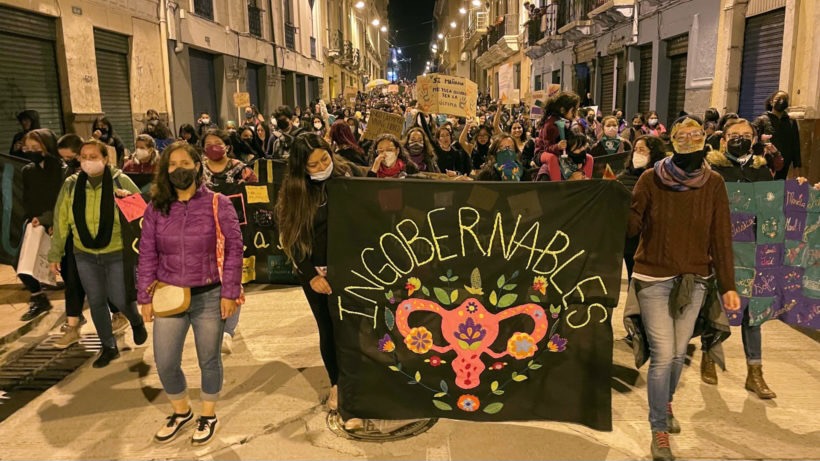On March 15, conservative Ecuadorian President, Guillermo Lasso, partially vetoed the bill that allowed women and girls to access abortions when pregnancy was the result of rape. Lasso alleged that the content of the bill did not entirely correspond to the Constitutional Court’s ruling that decriminalized the termination of pregnancy in such cases.
The initiative approved by the National Assembly on February 17, permited abortions up to 12 weeks of gestation for most adult women, with an extension of up to 18 weeks for minors and women in rural areas. The expansion of time-limit for Indigenous and rural women was intended to give them more time to find medical assistance because access to health care is unequal between urban and rural areas and between different social classes. Meanwhile, the prolongation of the deadline for minors was aimed at giving them appropriate time to identify pregnancy.
Nevertheless, Lasso suggested unifying the deadline at 12 weeks for all, without exception. “I firmly believe that our laws should not be a factor of division, but one of the encounters of all Ecuadorians in their vast diversity and plurality,” he said in an official statement.
Besides the unification of time-limit, Lasso also established that at least one of three prerequisites must be fulfilled to access abortion in rape cases: a complaint by the victim, an affidavit of legal age, or medical examination attesting the sexual assault. Additionally, he suggested respecting any conscientious objections that medical staff may submit to deal with such cases.
The head of state suggested a total of 61 changes to the bill. Now, the Parliament has a period of 30 days to decide whether to keep the text in its original form or include the president’s proposals in it. If the legislators fail to make a decision before the deadline ends, the presidential text will be considered final and will take effect immediately.
Feminist movements reject executive’s decision
Feminist movements and women’s rights organizations vehemently rejected the executive’s decision and his reasons to partially veto the bill, and vowed to continue fighting for reproductive rights.
Women’s rights organization Surkuna condemned that “the presidential veto to the abortion for rape law changes the object of the law: it is not a law to guarantee access but to obstruct it,” and added that “it violates the mandate of the Constitutional Court to legislate on the basis of highest human rights standards.” “From Surkuna, we reject the presidential veto that promotes inequity and inequality, and condemns rape survivors to clandestine torture and forced motherhood. Abortion in rape cases will be completely stymied by these changes,” the organzation rejected.
Likewise, legislator Johanna Moreira of the Democratic Left party, the bill’s rapporteur, criticized that “President Guillermo Lasso, with his partial veto, has not understood the painful reality that our girls live on a daily basis. Imposing short deadlines that will only affect the poorest and most forgotten, causing our women to lose their lives due to clandestine abortions.”
Feminist lawyer Lita Martínez Alvarado lamented that “while sexual and reproductive rights are advancing in Chile and the right to a safe, free abortion is recognized by the Constitutional Convention, in Ecuador we continue to face impositions and restrictions on the abortion for rape law.”
Erika Guevara-Rosas, Americas director at Amnesty International, also condemned the president’s decision. “President Guillermo Lasso partially vetoes abortion for rape law, but not for the right reasons. Lasso misses opportunity to strengthen access to abortion in rape cases, making deadlines more restrictive and turning his back on women and girls at greatest risk,” she tweeted.
The Center for Reproductive Rights, the IPPP Latin American and the Caribbean, Women’s Link, the Latin American and Caribbean Women’s Health Network, among other organizations, also rejected the veto of the law.
In February, when the Congress had approved the bill, reproductive rights organizations criticized that the bill failed to guarantee real and effective access to legal and safe to rape survivors. They demanded that the government implement a fair and restorative law that guarantees safe abortion services without time or legal barriers to victims of sexual violence.
Abortion in Ecuador
Ecuador allows abortions only when a woman’s life is at risk due to pregnancy, and when the pregnancy is the result of rape of a woman with a mental illness. In all other cases, it is punishable with up to two years in prison for women who receive abortions, and up to three years for health providers who perform abortions. According to a statistics from the State Attorney General’s Office, between 2014 to 2019, 286 women were imprisoned in the country for the crime of consensual abortion. Similarly, the Council of the Judiciary registered 134 cases, 80 involved women who had an abortion with their consent and 54 involved people who accompanied or had the women abort with their consent, such as mothers, friends, partners, doctors, etc.
Child rape and child pregnancy continue to be serious issues for Ecuadorian society. According to the National Sexual and Reproductive Health Plan, Ecuador has the third highest rate of adolescent pregnancy in Latin America. A data from the State Attorney General’s Office reveals that on an average 14 rape complaints are received per day, three of them are from girls under 14 years of age. Additionally, seven girls under the age of 14 give birth each day, and most of them are victims of sexual violence. Another study revealed that 15.6% of maternal deaths in the country happen due to clandestine abortions.





